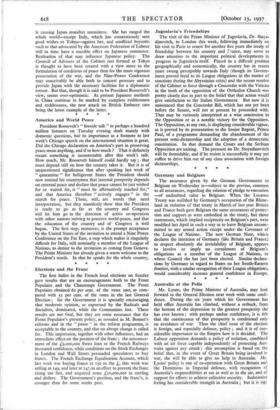Jugoslavia's Friendships The visit of the Prime Minister of Jugoslavia,
Dr. Stoya- clinovitch, to London this week, following immediately on his visit to Paris to renew for another five years the treaty of friendship between his country and France, may serve to draw attention to the important political developments in progress in Jugoslavia itself. Placed in a difficult position geographically and economically, the country has in recent years swung perceptibly towards Italy (though its Govern- ment proved loyal to its League obligations in the matter of sanctions during the Abyssinian crisis) and the recent resolve of the Cabinet to force through a Concordat with the Vatican in the teeth of the opposition of the Orthodox Church was pretty clearly due in part to the belief that that action would give satisfaction to the Italian Government. But now it is announced that the Concordat Bill, which has not yet been before the Senate, will not at present be proceeded with. That may be variously interpreted as a wise concession to the Opposition or as a notable victory for the Opposition. The Opposition, at any rate, is displaying considerable vigour, as is proved by its presentation to the Senior Regent, Prince Paul, of a programme demanding the abandonment of the present semi-dictatorship and the adoption of a democratic constitution. In that demand the Croats and the Serbian Opposition are uniting. The pressure on Dr. Stoyadinovitch will be formidable, and if he resists it successfully it may yet suffice to drive him out of any close association with foreign dictatorships.
* *






















































 Previous page
Previous page